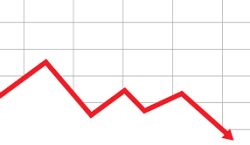

A split has emerged between Formula 1 teams as talks over the future of the sport reach a critical stage.
Half the teams object to plans to postpone the finalisation of a budget cap for 2021 from June until October.
Alfa Romeo, McLaren, Racing Point, Renault and Williams believe it is a back-door attempt by big teams to water down cost restrictions.
But Mercedes and Ferrari reject the claim and say the proposed 2021 rules are “immature” and need more work.
The stance of the five teams puts governing body the FIA and Formula 1 in a difficult position because regulations dictate that the 2021 rules have to be finalised by the end of this month, unless they can secure support from all the teams for a delay.

Mercedes and Ferrari want to see more work done on the proposed 2021 rules
And all agree that the sporting and technical rules are not ready for publication.
A meeting is planned between the various parties on Thursday, before a meeting of the FIA World Council, F1’s legislative body, on Friday, which has to decide what to do about publication of the rules.
McLaren chief executive officer Zak Brown, speaking exclusively to BBC Sport, said: “We want what will bring the best balance to the sport.
“As a sport we spend way more money than we need to go racing and put on a good show for the fans. We’re one of the few industries that hasn’t adjusted to today’s economic realities and as a major sport we have more financial imbalance among competitors than any other.
“We need to push forward so that every team has a reasonable opportunity to be competitive. We need to lock down the future of the sport before it’s too late.”
Enforcing an effective budget cap, as well as creating a more equitable split in revenues among the teams, is a matter of critical importance for the smaller outfits because F1 has turned into a two-tier championship.
Mercedes, Ferrari and Red Bull have budgets in the region of $300m-400m (£236m-315m) a year. The other teams’ budgets range from about $120m-210m (£94m-165m) and as a result they cannot hope to compete.
This locks in a situation where the smaller teams can never hope to win a race – and can only manage a podium finish in races where there are lots of incidents.
Renault, McLaren, Racing Point, Alfa Romeo and Williams feel that the current arrangements for the budget cap in 2021 are acceptable and do not want to open the door to any further changes.
The original plan was for the cap to be set at $150m a year, but after more than a year of talks that number has gone up to $175m, in addition to several exclusions.
Drivers, the salaries of the three highest paid executives, engine bills, marketing and hospitality, and race weekend travel and accommodation are not included in the cap. That could amount to as much as $75m extra, depending on the team.
The five would have preferred to have the figure set at $150m, but have agreed to the compromise number of $175m with the concession that it is introduced in 2021. Previously, a glide path down to the ultimate cap over three years from 2021 to 2023 had been planned.
But the teams will not sign off on a delay to the sporting and technical regulations without the budget cap being secured this month.
Their position effectively means the FIA has to either give in to their demands and fix the financial regulations now, or be forced to publish the entire set of 2021 rules at a time when the sporting and technical sides are not ready.
That is a significant problem for F1 and the FIA because major changes are being planned to the cars for 2021 to enable them to follow each other more closely and create better racing. If these are not thoroughly researched, the risk of problems when the cars emerge is significantly greater.
Renault F1 managing director Cyril Abiteboul said he had been “surprised” a delay was now being proposed.
He said: “The more time passes, the better it looks to be for the established teams taking advantage of their current power.

“I understand everyone accepts the principle of the financial regulations, budget cap, plus the figures and exclusions that have been come up with. So for me there is no reason to not set that in stone unless people are not acting in good faith and are willing indeed to get something different from what has been, we believe, agreed.”
Abiteboul added that confirming the financial regulations was “paramount”.
“We don’t want to be confrontational or force the system to adopt a set of regulations if they are not ready,” Abiteboul said, “so we are prepared to give more time to the various stakeholders without killing the momentum. Because I think there is a good momentum right now because of the emergency. When you remove the emergency there is always a risk of losing the momentum.
“But putting that aside, one thing that is really paramount for us is the financial regulations, for a couple of reasons.
“The main one is that we need to have some certainty now about the commercial set-up of F1 because we are still in the process of building our team, of finding what is the right operating level, and the figures we have now are very different from the ones that were floated by [commercial rights holder] Liberty and the FIA a bit more than a year ago.
“So who knows what will be the situation in six months’ time? So at some point it is good to take stock and draw a line in the sand and say: ‘This is what will happen.’ And we will be able to make our plans.”
Mercedes and Ferrari say they simply want to ensure the rules, when they are published, are effective and do the job they were intended to do.
Ferrari team boss Mattia Binotto said: “On the principle of the objectives, we are all on the same page and have been since the first time. But time is running out and we are late and the regulations have just been published and are not mature enough to be voted [on] so I think postponing was the proper decision.”
World champions Mercedes say they support the budget cap and think $175m is a sensible figure. And they point out that in recent seasons they have proved on several occasions that they were open to changes of rules even though these could have jeopardised their advantage.
Mercedes F1 boss Toto Wolff said changing the rules might not have the outcome some would like.
“The default reaction in the past when big teams were running away was to change the [regulations] in the hope people will catch up,” he said.
“The opposite is the case. If you leave regulations alone, eventually performance will converge.”
Changes were made to the front wing rules and tyre construction for this season with the intention of making the racing better, but the effect has been the opposite because Mercedes have adapted better and dominated the season.
Wolff said: “As in the past, teams lobby for change because they believe rolling the dice can be an advantage for them. In 2019, none of that has happened. So we are back to square one.
“We are making that mistake over and over again but it is very difficult from our position to be credible and be heard because people believe we want to maintain the rules as they are to maintain our advantage.” – bbc.com